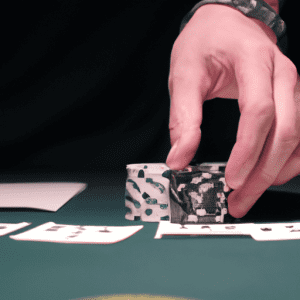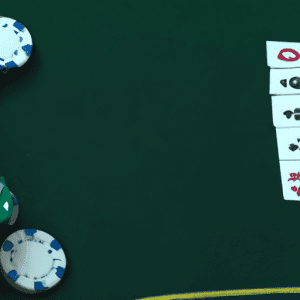When it comes to playing games, whether it’s poker, blackjack, or any other card game, there is more to winning than just having a good hand. Your table persona can play a significant role in influencing the dynamics of the game and ultimately determining your success. Understanding the power of table persona and how to enhance your game dynamics is essential for anyone looking to up their game.
The Power of Table Persona: Enhancing Your Game Dynamics
Your table persona is the way you present yourself at the table, both physically and mentally. It encompasses everything from your body language to your facial expressions, as well as your overall demeanor. The key is to project an image that instills confidence and commands respect from your opponents.
One important aspect of table persona is maintaining a calm and composed appearance. Even if you’re feeling nervous or uncertain on the inside, it’s crucial not to let it show. A steady and confident presence can intimidate your opponents and make them second-guess their own strategies. By exuding confidence, you can assert control over the game dynamics and potentially influence your opponents’ decisions.
Another element of table persona is being aware of your body language. How you sit, how you hold your cards, and how you interact with the chips all contribute to the impression you give off. Avoid fidgeting or displaying signs of anxiety, as this may reveal weakness to your opponents. Instead, strive for a relaxed but focused posture that suggests you are in control of the situation.
Facial expressions also play a vital role in table persona. While it’s important to maintain a neutral expression most of the time, occasionally showing subtle hints of emotion can work to your advantage. A slight smile when you have a strong hand or a thoughtful furrowed brow when contemplating a decision can be strategic moves that confuse your opponents and keep them guessing about your next move.
Additionally, your table persona extends beyond physical appearances. It includes the way you communicate with other players. Being polite and respectful, even when you’re in a heated competition, can help build rapport and foster a more positive atmosphere at the table. This can influence the dynamics of the game by encouraging others to reciprocate your behavior or even make them more inclined to cooperate with you strategically.
However, it’s important not to overdo it. Maintaining authenticity is key to establishing credibility and trust. If your table persona comes across as disingenuous or insincere, it may backfire and create mistrust among your opponents. Strike a balance between being friendly and competitive, ensuring that your actions align with your true intentions.
In conclusion, mastering your table persona is an essential skill for anyone looking to enhance their game dynamics. By projecting confidence, maintaining a calm appearance, and using strategic body language and facial expressions, you can influence how others perceive you and potentially impact their decisions. Additionally, fostering positive communication and building rapport with fellow players can contribute to a more cooperative and enjoyable gaming experience. Remember, your table persona is not just about winning the game; it’s about creating an engaging and immersive environment where everyone can enjoy themselves while sharpening their skills. So next time you sit down at the table, remember the power of your presence and use it to your advantage.
Mastering Table Persona for a Psychological Edge in Poker
Poker is not just a game of cards; it’s a battle of wits and psychological warfare. To truly excel in this high-stakes world, mastering table persona becomes essential. Your presence at the poker table can greatly influence the dynamics of the game, giving you a psychological edge over your opponents. In this article, we will explore how to develop and refine your table persona for maximum impact.
First and foremost, it’s important to understand that your table persona should be authentic. Trying to be someone you’re not will only backfire in the long run. Instead, focus on enhancing certain aspects of your personality that can work to your advantage. Are you naturally assertive? Embrace it and use it to project confidence. Do you have a calm demeanor? Leverage it to create an air of mystery and unpredictability. By staying true to yourself while amplifying certain traits, you’ll appear more genuine and believable to your opponents.
Body language plays a crucial role in shaping your table persona. Every movement, gesture, and facial expression sends a message to those around you. It’s important to be aware of what signals you are sending and how they may be interpreted by others. For example, maintaining steady eye contact can convey strength and confidence, while fidgeting or avoiding eye contact may suggest weakness or nervousness. By consciously controlling your body language, you can manipulate how others perceive you and ultimately gain an advantage at the table.
Another aspect of table persona mastery lies in your ability to control your emotions. Poker is an emotional rollercoaster, and displaying your feelings too openly can give away valuable information to observant opponents. Learning to maintain a stoic exterior even when faced with bad beats or great hands is key to keeping your opponents guessing. This doesn’t mean suppressing all emotions entirely; rather, it’s about finding the right balance between showing enough emotion to appear human and relatable, while keeping your true intentions hidden.
Timing is everything in poker, and your table persona can greatly impact how others perceive your actions. By carefully selecting when to be aggressive or passive, you can manipulate the flow of the game and control the actions of your opponents. For example, if you’ve been playing conservatively for a while, suddenly becoming more assertive can catch your opponents off guard and force them into making mistakes. On the other hand, adopting a more passive approach after a series of big wins can lull your opponents into a false sense of security, leading them to underestimate your hand strength.
Lastly, it’s important to remember that mastering table persona is an ongoing process. As you gain experience and play with different opponents, you’ll need to adapt and adjust your persona accordingly. What works against one player may not work against another. Pay attention to your opponents’ reactions and adjust your strategy accordingly. Flexibility and adaptability are key traits of a successful poker player.
In conclusion, developing and refining your table persona is crucial for gaining a psychological edge in poker. By staying authentic, controlling your body language, managing your emotions, timing your actions strategically, and remaining adaptable, you can influence the dynamics of the game and ultimately increase your chances of success. So, embrace your unique personality, project confidence, and let your table persona take you to new heights at the poker table.
Unleashing Your Presence: How Table Persona Mastery Influences the Game


Have you ever wondered how some players seem to have an uncanny ability to influence the outcome of a game? It’s not just luck or skill that sets them apart; it’s their table persona mastery. Your presence at the table can greatly impact the dynamics of the game, and learning to harness this power can give you a significant advantage.
So, what exactly is table persona mastery? It’s the art of understanding and controlling the way others perceive you during a game. By carefully crafting your image and manipulating the impressions you make on fellow players, you can shape their behavior and decisions, ultimately influencing the course of the game.
The first step in mastering your table persona is self-awareness. You need to understand how you come across to others and be conscious of the signals you’re sending. Are you projecting confidence or uncertainty? Are you appearing aggressive or passive? These subtle cues can have a profound impact on how others perceive you and respond to your actions.
Once you have a clear sense of your own table persona, it’s time to start leveraging it strategically. One powerful technique is mirroring, where you subtly mimic the behavior and body language of other players. Mirroring creates a sense of familiarity and rapport, making others more likely to trust and cooperate with you. However, it’s important to strike a balance between mirroring and maintaining your individuality – too much imitation can come across as insincere or manipulative.
Another effective tactic is storytelling. Humans are wired for narratives, and weaving compelling stories can captivate your fellow players’ attention and sway their opinions. Whether you’re recounting a personal anecdote or creating a fictional tale, storytelling adds depth and dimension to your table persona, making you more memorable and influential.
Nonverbal communication plays a crucial role in table persona mastery. Your body language, facial expressions, and gestures all contribute to the impression you make on others. Maintaining good eye contact shows confidence and engagement, while a relaxed posture can indicate ease and control. By consciously managing your nonverbal cues, you can convey the desired image and influence how others perceive you.
It’s essential to be adaptable in your table persona. Different games and opponents call for different approaches. In some situations, being assertive and dominant may be advantageous, while in others, a more passive and observant demeanor might yield better results. Flexibility is key – adjusting your table persona to suit the circumstances will maximize your influence over the game dynamics.
However, it’s important to note that table persona mastery should never cross into unethical or manipulative territory. While influencing the game is part of the strategy, fairness and respect for fellow players should always be upheld. Ultimately, the goal is to enhance your gameplay experience and create a positive atmosphere for everyone involved.
In conclusion, mastering your table persona is a powerful tool for influencing game dynamics. Understanding how you come across to others, leveraging techniques like mirroring and storytelling, and managing your nonverbal communication can greatly impact the course of a game. Adaptability and ethical conduct are crucial elements of table persona mastery, ensuring a fair and enjoyable experience for all players. So, next time you sit down at the table, remember the power of your presence and use it wisely to shape the outcome in your favor.
Leveraging Table Persona to Gain an Advantage in Poker Strategy
When it comes to poker strategy, many players focus solely on the cards they hold and the mathematical probabilities of winning. While these factors are undoubtedly important, there is another element that can greatly influence the dynamics of a poker game – your table persona. The way you present yourself at the table can have a significant impact on how other players perceive you and ultimately affect their decisions.
Developing a strong table persona requires careful consideration and practice. It involves creating an image that is both believable and consistent throughout the game. By doing so, you can manipulate the actions of your opponents and gain a valuable advantage.
One key aspect of table persona mastery is maintaining a friendly demeanor. Being approachable and engaging with your fellow players can help create a positive atmosphere at the table. This not only makes the game more enjoyable for everyone involved but also allows you to gather information about your opponents. Friendly banter can often lead to revealing conversations, giving you insights into their thought processes and strategies.
However, it’s essential to strike a balance between friendliness and intimidation. While being likable can encourage others to underestimate you, exuding confidence and assertiveness can make them think twice before challenging your bets. A well-crafted table persona should be able to switch between charm and dominance depending on the situation, keeping your opponents guessing and off-balance.
Another crucial aspect of table persona mastery is consistency. Once you establish a certain image, it’s vital to maintain it throughout the game. Abrupt changes in behavior or demeanor can raise suspicions among observant opponents. If you start off as an aggressive player, continue playing aggressively. If you portray yourself as a cautious and conservative player, stick to that style. Consistency breeds trust and credibility, which can be exploited to manipulate your opponents’ actions.
In addition to consistency, understanding the strengths and weaknesses of different personas can further enhance your advantage. For example, the “loose-aggressive” persona is known for its fearless and aggressive betting style. This persona can be effective in intimidating opponents and forcing them to fold their hands. However, it’s important to be mindful of potential risks, such as attracting stronger players who are willing to challenge your bets.
On the other hand, the “tight-passive” persona relies on patience and selective betting. By playing fewer hands but carefully choosing when to bet, this persona can create an illusion of strength. Opponents may become hesitant to challenge you, fearing that you only play with strong cards. However, caution must be exercised not to appear too passive, as this can lead to missed opportunities and smaller pots.
While personas can greatly influence game dynamics, it’s crucial to remain adaptable and responsive to changing circumstances. Being aware of how your table persona is perceived by others is key to adjusting your strategy accordingly. If your opponents start catching on to your tactics, it might be time to switch gears and adopt a different persona. The ability to adapt and evolve your table persona throughout a game demonstrates flexibility and keeps your opponents guessing.
In conclusion, mastering table persona is a valuable skill that can significantly impact the dynamics of a poker game. By creating a consistent and believable image, you can manipulate the actions of your opponents and gain a strategic advantage. Being friendly yet assertive, maintaining consistency, understanding the strengths and weaknesses of different personas, and remaining adaptable are all key elements in leveraging table persona to enhance your poker strategy. So, next time you sit down at the poker table, remember the power of your presence and use it to your advantage.
Exploring the Psychological Impact of Table Persona on Poker Gameplay
When it comes to poker, the game is not just about the cards you hold or the strategies you employ. It’s also about the persona you present at the table. Your presence can have a profound psychological impact on the dynamics of the game, and mastering your table persona can give you a significant advantage.
One of the key aspects of table persona mastery is understanding the power of perception. How others perceive you at the table can greatly influence their decision-making process. By carefully crafting your image, you can manipulate how opponents view you and use that to your advantage.
For example, projecting an image of confidence and assertiveness can intimidate other players, making them more likely to fold in face of your bets. On the other hand, appearing meek and uncertain might encourage aggressive players to take advantage of you, leading to bigger pots when you do have a strong hand.
Additionally, your table persona can affect the overall mood of the table. Creating a friendly and sociable atmosphere can foster a sense of camaraderie among players, making them more willing to engage in conversation and share information. This can be particularly useful when trying to gather insights into opponents’ playing styles or weaknesses.
Conversely, adopting a more aloof or detached demeanor can create an air of mystery around you, leaving other players unsure of what to expect. This can make it difficult for them to read your intentions, giving you an edge in bluffing and creating uncertainty in their decision-making process.
Another important aspect of table persona mastery is adaptability. The ability to adjust your persona based on the specific circumstances of each game is crucial. Different tables have different dynamics, and being able to recognize and adapt to these dynamics can greatly enhance your chances of success.
For instance, if you find yourself at a table with predominantly tight and cautious players, adopting a more aggressive and unpredictable persona can catch them off guard, leading to more opportunities for big wins. On the other hand, if you’re facing a table of loose and aggressive players, taking on a more conservative and patient persona can help you weather their onslaught and capitalize on their mistakes.
Moreover, it’s important to remember that your table persona is not just about how others perceive you; it also impacts how you perceive yourself. Confidence is key in poker, and projecting an image of confidence can actually boost your own self-assurance. By assuming a confident persona, you are more likely to make bold moves and trust your instincts, which can be crucial in high-pressure situations.
However, it’s essential to strike a balance between confidence and overconfidence. Overplaying your persona can lead to reckless decisions and unnecessary risks. It’s important to remain grounded and aware of the actual strength of your hand, rather than relying solely on the power of your presence.
In conclusion, mastering your table persona is a skill that can greatly influence the dynamics of poker gameplay. By understanding the power of perception, creating a friendly or mysterious atmosphere, adapting to different tables, and finding the right balance of confidence, you can gain a significant advantage over your opponents. So next time you sit down at the poker table, remember that your presence matters just as much as the cards in your hand.













